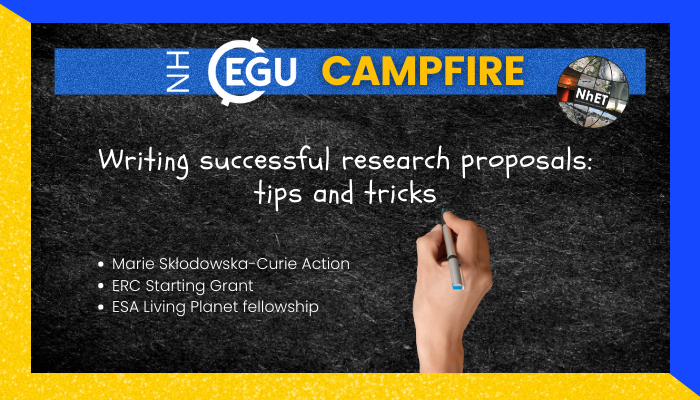
Have you arrived at that moment in your career when you have some potential ideas that you think would be relevant to science? Do you need financial support to advance your science career, and decided to apply for a grant? Today’s blog post brings you a good starting point with advice from three grant winners during the campfire organised by the NH ECS division team: “Writing successful research proposals: tips and tricks”.
The first speaker, Madeleine Vickers, from the Centre for Earth Evolution and Dynamics, University of Oslo, won the Marie Skłodowska-Curie Action (MSC). She is specialised in complex interactions driving paleoclimate changes throughout the Phanerozoic. The second speaker, Morelia Urlaub, from the Helmholtz Centre for Ocean Research, Kiel, won a European Research Council (ERC) Starting Grant with the project PRE-COLLAPSE (Slow sliding of volcanic flanks as PREcursor to catastrophic COLLAPSE). Finally, Matthew Gaddes, from COMET – School of Earth and Environment, University of Leeds, won the European Space Agency (ESA) Living Planet fellowship. His project is focused on monitoring subaerial volcanoes by using machine learning methods on Sentinel-1 products.
Starting point: the novelty of the study
Whatever proposal starts from an idea. This must be interesting and novel. The novelty of the idea may be more or less stringent depending on the grant. A proposal for the ESA Living Planet fellowship can start from the work of your PhD thesis. To win an ERC starting grant, the proposal must not be based on previous works. It must fit with your skills, but you have space to explore paths that deviate from your current research. The ERC is a personal grant where you are asked not only to write a proposal but also to discuss it in front of panellists. Therefore, it is important to bring your own idea, not your supervisor’s or other people’s. Regarding the MSC, Madeleine Vicker suggests having, before applying, some preliminary results that prove the feasibility and potentiality to develop the study, for example as a published paper or conference participation.
Also, the level of accepted risk from your project is variable. Smaller grants, like the one from ESA, favour low-risk proposals. The ERC commission, on the contrary, appreciates high-risk projects. For this reason, whilst writing a proposal for an ERC, it is necessary to spend enough time reasoning a contingency plan. Hence, the project must advance the research and provide interesting results if it fails to achieve all that was scheduled or if the assumed hypothesis proves wrong. The results of plan B should be interesting.
Time makes the difference!
Timing may make a difference when you are looking for funding. Bringing your proposal out when there is already attention on the location, methodology or subject of your idea but in different projects and thematic areas may add value to your proposal. Timing is also about your personal time. A proposal writing may require a month to be written and it is difficult to find this time during a full-time PhD. In addition, some grants have age limits. For example, the ERC starting grant is open to researchers with 2 to 7 years of experience since completion of PhD and it is preferable to prepare yourself in time to have the possibility to resubmit the proposal in case of rejection. Finally, some months inevitably pass from submission up to acceptance and money disposal. Funding opportunities may be looked for in advance.
Improve your writing skills
Most of the institutions offer courses about proposal writing. Look for them and find time to attend. You can also read previous years’ winning proposals, to have a clearer idea of the structure and content. You will hardly find them published online but you can contact past winners and ask them directly for the proposal.
If you are at the beginning of your career, you may want to look for your institution’s or your supervisor’s support to navigate the budget organisation; if you are writing your first proposal it may be scary.
Although in some ways, writing a proposal may recall writing a thesis, there is a substantial difference between the two. In a thesis or a journal paper, you know your results, on the contrary, in a proposal you have an idea of what you want to find. Consequently, you will focus on why your expected results are interesting since you have yet to obtain them.
You must be standing out
Even though the idea is the most important element of a proposal, your career also has a role. Standing out as a person is an important addition, mainly for ERC. In order to achieve this, it is useful to have publications as a single author or with different authors to prove your independence from your supervisor. You should also have experience in project management or leading people. This may be, however, less needed for smaller grants, like the ESA Living Planet fellowship. Finally, it is always worth considering having project partners who are recognised experts in the field and cover your project’s main competencies.
A last but not least comment, go get it without being afraid or waiting for encouragement.
For more information about the mentioned grants and others:
https://blogs.egu.eu/divisions/nh/2018/06/04/fantastic-grants-and-where-to-find-them-part-1/
Edited by: Paulo Hader and Joana Parente
